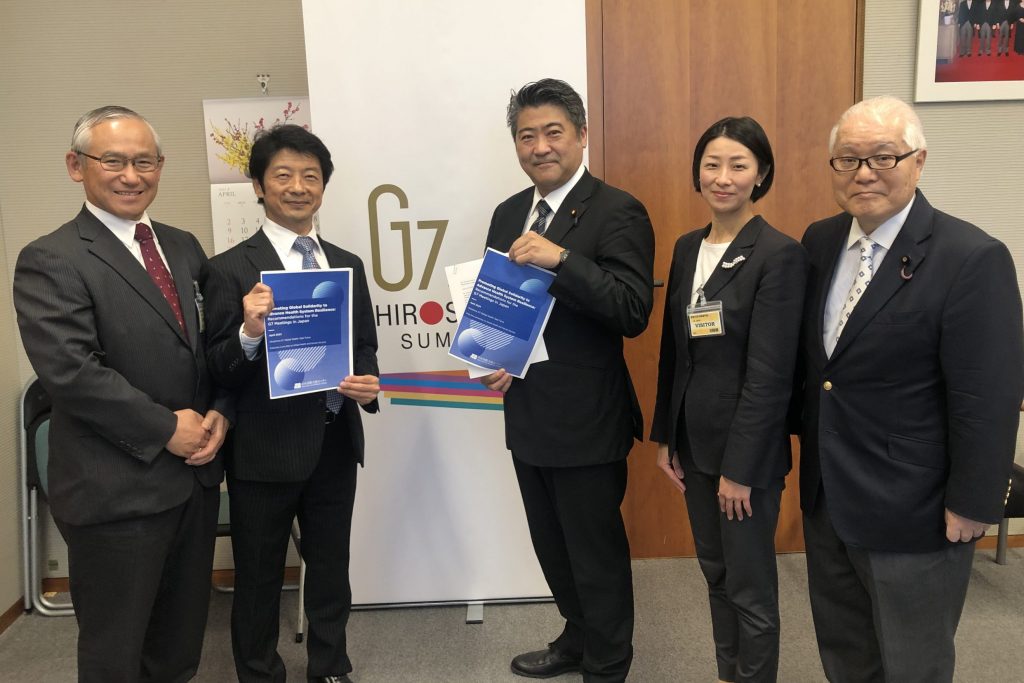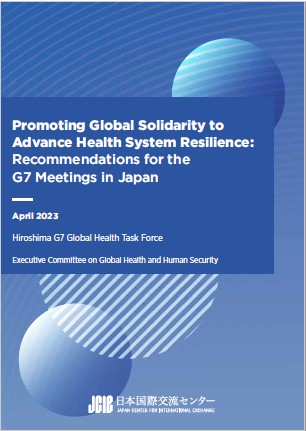The Hiroshima G7 Global Health Task Force, led by Professor Hideaki Shiroyama of the University of Tokyo, have published their recommendations on global health priorities for the upcoming 2023 G7 Summit. The Task Force was organized under JCIE’s Executive Committee on Global Health and Human Security (Chairman: Keizo Takemi, Member of the House of Councilors), and was comprised of Japanese members and international advisors representing a broad range of stakeholders. The Task Force established working groups in Japan on UHC, the 100 Days Mission Plus, and the global health architecture, with relevant experts selected for each topic to discuss challenges and formulate recommendations. Additionally, key global health experts were asked to serve as domestic and international advisors and provide input through a series of consultations and hearings in the last quarter of 2022 and the first quarter of 2023.
The G7 Finance Ministers’ Meeting and the G7 Health Ministers’ Meeting will be held in May along with the G7 Summit and related meetings. Ahead of these meetings, the G7 Health Task Force released their recommendations outlining key actions required of the 2023 G7 to build strong global health system to effectively respond to future health crises.
More than three years have passed since COVID-19 was declared a pandemic, and international discussions on pandemic prevention, preparedness, and response (PPR) informed by experiences from the COVID-19 pandemic are still ongoing. Based on past G7 agreements and other international discussions, the Task Force has recommended a range of actions for the G7 to adopt in 2023 to prevent another pandemic like COVID-19 from occurring, and to continue to encourage global solidarity in an international community that is becoming increasingly tense and confrontational.
The Task Force’s final recommendations were presented on April 28, 2023, to Seiji Kihara, Deputy Chief Cabinet Secretary by representatives of the Task Force and the Executive Committee on Global Health and Human Security. The Task Force’s international advisors have also submitted a letter to Prime Minister Fumio Kishida stressing that a follow-up after the Hiroshima G7 Summit is essential to ensure that the PPR discussion will be taken over by the 2024 G7 in Italy.
The main points regarding actions to be taken by the G7 leaders are summarized below.

SUMMARY OF RECOMMENDATIONS
Support Country-Led Efforts to Achieve Universal Health Coverage
Since 2013, Japan has promoted UHC as a central principle of its international health diplomacy. In order to prepare for future health crises, countries must establish equitable and resilient health systems under the goal of UHC. These health systems should be resilient in the face of emerging infectious diseases and provide essential health services o those most vulnerable. Based on this, the Task Force calls on the G7 to:
- Integrate PPR into national UHC strategies with a focus on primary health care (PHC)
- Address interactions among non-communicable diseases (NCDs), infectious diseases, and social determinants of health
- Facilitate investments in UHC through harmonized external assistance and domestic financing
Ensure a comprehensive approach to advance timely and equitable access to life-saving medical countermeasures (MCMs) that recognizes them as global common goods
In order to effectively respond to a pandemic, it is the responsibility of a country’s government to rapidly provide the public with MCMs, such as new tests, vaccines, and treatments. However, in a world where technology, development, raw materials, and financial resources are unevenly distributed, it is essential to have a mechanism to correct the disparities, including international collaboration and decentralization of innovation and manufacturing capacity (e.g., technology transfer, voluntary licensing agreements, etc.), in order to ensure that inequities such as the vaccine disparity seen in the COVID-19 pandemic will not occur again. Based on the G7’s commitment to UHC, it must reaffirm the importance of achieving equitable access to innovative technologies in times of health crises. The Task Force calls on the G7 to:
- Accelerate R&D for MCMs
- Promote timely access to MCMs
- Promote equitable access to MCMs
- Promote an “always-on” approach
- Launch a globally inclusive “access initiative” to link R&D with delivery and access
Promote multilayered global health governance to facilitate effective collaboration among state and nonstate actors at the global and regional level
While global solidarity is essential to respond to a global pandemic, a global mechanism such as the Access to COVID-19 Tools (ACT) Accelerator alone will not be sufficient to achieve equitable access and a pandemic response tailored to local and regional levels. The participation of nongovernmental actors is also essential to ensure innovation, accountability, and transparency and to reduce disparities. It is critical to address the various factors affecting health, particularly human and animal health, and the connection to environmental and planetary health. In light of the above, the Task Force calls on the G7 to:
- Ensure global solidarity in terms of norm-setting, financing, and governance
- Strengthen regional hubs for PPR as a regional security strategy
- Promote a multisectoral approach to comprehensive and interdisciplinary health solutions

